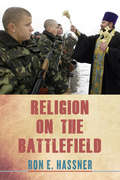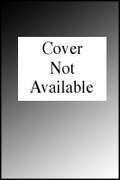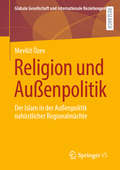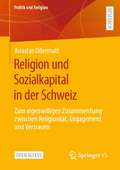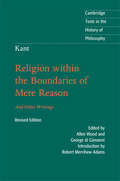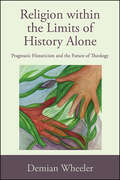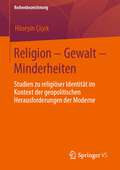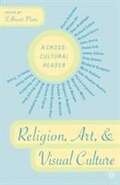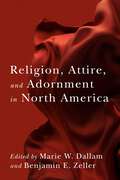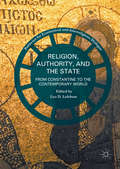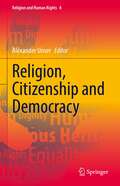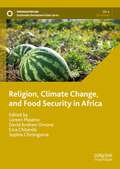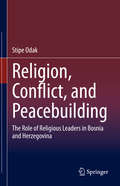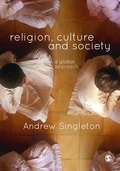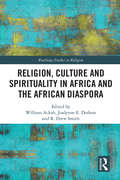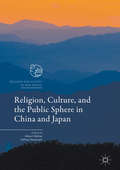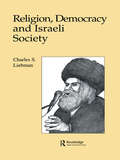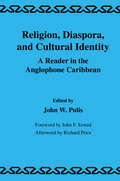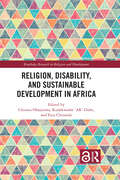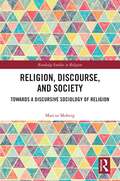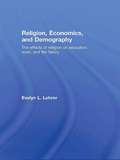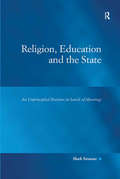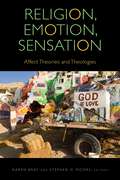- Table View
- List View
Religion on the Battlefield
by Ron E. HassnerHow does religion shape the modern battlefield? Ron E. Hassner proposes that religion acts as a force multiplier, both enabling and constraining military operations. This is true not only for religiously radicalized fighters but also for professional soldiers. In the last century, religion has influenced modern militaries in the timing of attacks, the selection of targets for assault, the zeal with which units execute their mission, and the ability of individual soldiers to face the challenge of war. Religious ideas have not provided the reasons why conventional militaries fight, but religious practices have influenced their ability to do so effectively.In Religion on the Battlefield, Hassner focuses on the everyday practice of religion in a military context: the prayers, rituals, fasts, and feasts of the religious practitioners who make up the bulk of the adversaries in, bystanders to, and observers of armed conflicts. To show that religious practices have influenced battlefield decision making, Hassner draws most of his examples from major wars involving Western militaries. They include British soldiers in the trenches of World War I, U.S. pilots in World War II, and U.S. Marines in Iraq and Afghanistan. Hassner shows that even modern, rational, and bureaucratized military organizations have taken—and must take—religious practice into account in the conduct of war.
Religion on the Margins: Embodied Moravian Pieties on the Edges of Atlantic World Empire (Pietist, Moravian, and Anabaptist Studies)
by Benjamin M. PietrenkaIn the eighteenth century, missionaries of the radical, Pietist Moravian Church wandered from Germanic Europe to the edges of the known world in search of tolerance and a closer relationship to God. This open-minded, cosmopolitan undertaking led to unintended consequences, however, both for the Moravians and for the other persecuted peoples—European, African, and Indigenous—they sought to convert.Religion on the Margins examines the complexities of early modern Moravians as a cosmopolitan community focused on an eschatological global vision while having to negotiate diverse cultures and, most importantly, the institution of slavery. Drawing on a transatlantic archive of letters, diaries, teachings, and mission histories, Benjamin M. Pietrenka sheds light on how a professedly anti-colonial cast of characters became entangled in the complex realities of European colonialism in the Atlantic world. Ultimately, Pietrenka shows how the Moravians, operating from within the constraints of mission work, became complicit in the European imperial project in spite of their stated values and their own experience of marginalization.For scholars of early modern religion, empire, and politics, Pietrenka’s book challenges tendencies in the field to equate modernity with secularization and invites us to consider how nonelite actors understood religion and ethnicity through each other, in ways that contributed to the emergence of modern scientific racism and white supremacy.
Religion und Außenpolitik: Der Islam in der Außenpolitik nahöstlicher Regionalmächte (Globale Gesellschaft und internationale Beziehungen)
by Mevlüt ÖzevWie beeinflusst Religion die internationale Politik? Diese Frage gewinnt zunehmend an Bedeutung, da vielerorts der Aufstieg religiöser Bewegungen und Parteien erkennbar ist. Mevlüt Özev untersucht dieses Phänomen anhand der machtpolitischen Rivalität zwischen dem Iran, Saudi-Arabien und der Türkei im Nahen Osten. Die nahöstlichen Regionalmächte nutzen den Islam als außenpolitisches Instrument und verfolgen dabei weitreichende Führungsambitionen. Der Autor zeigt, warum die Region anfällig für zwischenstaatliche Konflikte ist und wie ein Ausweg aus dieser Krise gefunden werden kann.
Religion und Sozialkapital in der Schweiz: Zum eigenwilligen Zusammenhang zwischen Religiosität, Engagement und Vertrauen (Politik und Religion)
by Anastas OdermattIn diesem Open-Access-Buch unterzieht Anastas Odermatt die weitverbreitete Annahme, dass sowohl Religion als auch freiwilliges Engagement förderlich für soziales Vertrauen und damit für gesellschaftlichen Zusammenhalt und Demokratie seien, einer empirischen Überprüfung. Wirkt Religion eher konflikthaft und negativ auf unsere Gesellschaft oder wirkt sie eher brückenbildend, stabilisierend und damit positiv? Diese Frage wird in Wissenschaft und Öffentlichkeit kontrovers diskutiert und unterschiedlich beantwortet. Basierend auf den Daten des KONID Survey 2019 für die Schweiz werden die Wirkmechanismen zwischen Religion und Religiosität, freiwilligem Engagement und sozialem Vertrauen in der Schweiz vertieft untersucht und allgemein verständlich erklärt. Dabei ergibt sich ein differenziertes Bild für die unterschiedlichen, teils eigenwilligen Zusammenhänge – neue Erkenntnisse und einige Überraschungen miteingeschlossen.
Religion within the Boundaries of Mere Reason and other writings: And Other Writings (Cambridge Texts in the History of Philosophy)
by Immanuel Kant George Di Giovanni Allen WoodReligion within the Boundaries of Mere Reason is a key element of the system of philosophy which Kant introduced with his Critique of Pure Reason, and a work of major importance in the history of Western religious thought.<P><P> It represents a great philosopher's attempt to spell out the form and content of a type of religion that would be grounded in moral reason and would meet the needs of ethical life. It includes sharply critical and boldly constructive discussions on topics not often treated by philosophers, including such traditional theological concepts as original sin and the salvation or 'justification' of a sinner, and the idea of the proper role of a church.<P> This new edition includes slightly revised translations, a revised introduction with expanded discussion of certain key themes in the work, and up-to-date guidance on further reading. <P>Revised and updated to take into account new scholarship on Kant and on this key work. The translations are both accurate and readable, making this an ideal text for university courses. <P>Explores religious issues that are often overlooked by philosophers, discussing traditional theological concepts such as original sin.
Religion within the Boundaries of Mere Reason: And Other Writings
by Immanuel KantReligion within the Boundaries of Mere Reason, a work of major importance in the history of Western religious thought, represents a great philosopher's attempt to spell out the form and content of a type of religion that would be grounded in moral reason and would meet the needs of ethical life. This volume presents it, together with three short essays that illuminate it, in a new translation by Allen Wood and George di Giovanni, with an introduction by Robert Merrihew Adams that locates this essential essay in its historical and philosophical context.
Religion within the Limits of History Alone: Pragmatic Historicism and the Future of Theology
by Demian WheelerAmong the greatest challenges facing religious thinkers today is that created by historicism, the notion that human beings and their myriad understandings of reality are utterly historical, conditioned by contingent circumstances and tied to particular contexts. In this book, Demian Wheeler confronts the historicist challenge by delineating and defending a particular trajectory of historicist thought known as pragmatic historicism. Rooted in the German Enlightenment and fully developed within the early Chicago school of theology, pragmatic historicism is a predominantly American tradition that was philosophically nurtured by classical pragmatism and its intellectual siblings, naturalism and radical empiricism. Religion within the Limits of History Alone not only undertakes a detailed genealogy of this pragmatic historicist lineage but also sets forth a constructive program for contemporary theology by charting a path for its future development. Wheeler shows that pragmatic historicism is an underdeveloped resource for contemporary theology since it offers a model for normative religious thought that is theologically compelling yet wholly nonsupernaturalistic, deeply pluralistic, unflinchingly liberal, and radically historicist.
Religion without God
by Ronald DworkinIn his last book, Ronald Dworkin addresses questions that men and women have asked through the ages: What is religion and what is God's place in it? What is death and what is immortality? Based on the 2011 Einstein Lectures, Religion without God is inspired by remarks Einstein made that if religion consists of awe toward mysteries which "manifest themselves in the highest wisdom and the most radiant beauty, and which our dull faculties can comprehend only in the most primitive forms," then, he, Einstein, was a religious person. Dworkin joins Einstein's sense of cosmic mystery and beauty to the claim that value is objective, independent of mind, and immanent in the world. He rejects the metaphysics of naturalism--that nothing is real except what can be studied by the natural sciences. Belief in God is one manifestation of this deeper worldview, but not the only one. The conviction that God underwrites value presupposes a prior commitment to the independent reality of that value--a commitment that is available to nonbelievers as well. So theists share a commitment with some atheists that is more fundamental than what divides them. Freedom of religion should flow not from a respect for belief in God but from the right to ethical independence. Dworkin hoped that this short book would contribute to rational conversation and the softening of religious fear and hatred. Religion without God is the work of a humanist who recognized both the possibilities and limitations of humanity.
Religion – Gewalt – Minderheiten: Studien zu religiöser Identität im Kontext der geopolitischen Herausforderungen der Moderne
by Hüseyin ÇiçekDer Band nimmt aus unterschiedlichen religionswissenschaftlichen und sozialwissenschaftlichen Perspektiven aktuelle Themen der Religionswissenschaft in den Blick. Sie gehen explizit oder implizit von der zentralen religionswissenschaftlichen sowie -politischen These aus, dass Solidarität im Inneren von Gemeinschaften durch Feindschaft nach Außen begünstigt wird. Diese simpel wirkende Formel hat viele Facetten und wird deshalb in den jeweiligen Artikeln mit dem spezifischen Fokus auf Religion, Gewalt/Terrorismus und Minderheiten aus unterschiedlichen Perspektiven analysiert, um sie sowohl komparativ als auch konnektiv auf den Prüfstand zu stellen.
Religion, Art, and Visual Culture: A Cross-Cultural Reader
by S. Brent PlateThis book is a cross-cultural exploration of the study of visuality and the arts from a religious perspective. This forward looking and accessible collection gathers together the most current scholarship for those interested in art, religion, visual culture, and cultural studies. <p><p> Inherently interdisciplinary, this reader approaches the study of world religions through the human, meaning-making activity of seeing. The volume oscillates between specific visual subjects (painting, landscape gardens, calligraphy, architecture, mass media) and the broader theoretical discourses which are relevant to Humanities students today.
Religion, Attire, and Adornment in North America
by Marie W. Dallam and Benjamin E. ZellerClothing, dress, and ornamentation are crucial parts of individual and communal religious life and practice, yet they are too often overlooked. This book convenes leading scholars to explore the roles of attire and adornment in the creation and communication of religious meaning, identity, and community. Contributors investigate aspects of religious dress in North America in the nineteenth, twentieth, and twenty-first centuries, considering adornment practices in a wide range of religious traditions and among individuals who straddle religious boundaries. The collection is organized around four frameworks for understanding the material culture of religion: theological interpretation, identity formation, negotiation of tradition, and activism.Religion, Attire, and Adornment in North America features essays on topics such as Black Israelites’ use of African fabrics, Christian religious tattoos, Wiccan ritual nudity, Amish “plain dress,” Mormon sacred garments, Hare Krishna robes, and the Church of Body Modification. Spanning the diversity of religious practice and expression, this book is suitable for a range of undergraduate courses and offers new insights for scholars in many disciplines.
Religion, Authority, and the State
by Leo D. LefebureIn commemoration of Constantine's grant of freedom of religion to Christians, this wide-ranging volume examines the ambiguous legacy of this emperor in relation to the present world, discussing the perennial challenges of relations between religions and governments. The authors examine the new global ecumenical movement inspired by Pentecostals, the role of religion in the Irish Easter rebellion against the British, and the relation between religious freedom and government in the United States. Other essays debate the relation of Islam to the violence in Nigeria, the place of the family in church-state relations in the Philippines, the role of confessional identity in the political struggles in the Balkans, and the construction of Slavophile identity in nineteenth-century Russian Orthodox political theology. The volume also investigates the contrast between written constitutions and actual practice in the relations between governments and religions in Australia, Indonesia, and Egypt. The case studies and surveys illuminate both specific contexts and also widespread currents in religion-state relations across the world.
Religion, Citizenship and Democracy (Religion and Human Rights #8)
by Alexander UnserThis innovative volume is focused on the impact of religion on the realization of democratic citizenship. The researchers contributing provide empirical evidence on how religion influences attitudes towards citizenship and democracy in different countries. The book also tackles the challenges and opportunities for citizenship education. Experts contributing from sociology, political science, theology, and educational science look at the impact of religious beliefs and practices on democratic attitudes and behavior. Chapters also concern how religion influences the recognition of others as citizens. The text appeals to graduates and researchers in these fields with a secondary market for the general interest reader.
Religion, Climate Change, and Food Security in Africa (Sustainable Development Goals Series)
by Ezra Chitando Sophia Chirongoma Loreen Maseno David Andrew OmonaThis book addresses the relationship between religion, climate change, and food security in Africa. Contributors to this volume interrogate how and to what extent religion in Africa serves as a resource (or confounding factor) in responding to Sustainable Development Goals 13 (action on climate change) and 2 (achieve Zero Hunger, achieve food security and improved nutrition, and promote sustainable agriculture). Approaching the theme from diverse disciplinary and methodological angles, contributors probe the potential role of religion in Africa to accelerate the achievement of these two SDGs, especially the role of religion with regard to food availability, food accessibility, food utilization, and food systems stability.
Religion, Conflict, and Peacebuilding: The Role of Religious Leaders in Bosnia and Herzegovina
by Stipe OdakThis book provides fresh insights into the role of religious leaders in conflict transformation and peacebuilding. Based on a large dataset of interviews with Christian and Muslim leaders in Bosnia and Herzegovina, it offers a contextually rich analysis of the main post-conflict challenges: forgiveness, reconciliation, and tragic memories. Designed as an inductive, qualitative research, it also develops an integrative theoretical model of religiously-inspired engagement in conflict transformation. The work introduces a number of new concepts which are relevant for both theory and practice of peacebuilding, such as Residue of Forgiveness, Degree Zero of Reconciliation, Ecumene of Compassion, and Phantomic Memories. The book, furthermore, proposes two correlated concepts – “theological dissonance” and “pastoral optimization” – as theoretical tools to describe the interplay between moral ideals and practical limitations. The text is a valuable resource for religious and social scholars alike, especially those interested in topics of peace, conflict, and justice. From the methodological standpoint, it is an original and audacious attempt at bringing together theological, philosophical, and political narratives on conflicts and peace through the innovative use of the Grounded Theory approach.
Religion, Culture & Society: A Global Approach
by Andrew Singleton"The reader is taken on a global exploration of the forms and diversities of religions and their social and cultural contexts... It is up to the minute in research and theory, and comfortably grounded in the traditions of the social explanation of things religious and spiritual." - Gary Bouma AM, Monash University "Tells how sociology of religion originated in the work of key nineteenth and twentieth century theorists and then brings the story into the present era of globalization, hybrid spirituality, and the Internet. Students of religion will find this an engaging and informative survey of the field." - Robert Wuthnow, Princeton University "It considers the 'big questions' - What is religion? How is religion changing in a modern world? What is the future of religion? - and addresses them through tangible case studies and observations of contemporary life. Its global perspective reflects the breadth, diversity and vibrancy of this field." - Sylvia Collins-Mayo, Kingston University This is a rich and dynamic introduction to the varieties of religious life and the central issues in the sociology of religion today. It leads the reader through the key ideas and main debates within the field as well as offering in-depth descriptions and analysis of topics such as secularization, fundamentalism, Pentecostal Christianity, Buddhism, Hinduism, Islam, atheism, 'The spiritual marketplace', digital religion and new religions like Wicca. Emphasising religion as a global phenomenon, examining especially the ways in which globalization has had an impact on everyday religious life, Singleton has created an illuminating text suitable for students in a wide range of courses looking at religion as a social and cultural phenomenon.
Religion, Culture and Spirituality in Africa and the African Diaspora (Routledge Studies in Religion)
by R. Drew Smith William Ackah Jualynne E. DodsonReligion, Culture and Spirituality in Africa and the African Diaspora explores the ways in which religious ideas and beliefs continue to play a crucial role in the lives of people of African descent. The chapters in this volume use historical and contemporary examples to show how people of African descent develop and engage with spiritual rituals, organizations and practices to make sense of their lives, challenge injustices and creatively express their spiritual imaginings. This book poses and answers the following critical questions: To what extent are ideas of spirituality emanating from Africa and the diaspora still influenced by an African aesthetic? What impact has globalisation had on spiritual and cultural identities of peoples on African descendant peoples? And what is the utility of the practices and social organizations that house African spiritual expression in tackling social, political cultural and economic inequities? The essays in this volume reveal how spirituality weaves and intersects with issues of gender, class, sexuality and race across Africa and the diaspora. It will appeal to researchers and postgraduate students interested in the study of African religions, race and religion, sociology of religion and anthropology.
Religion, Culture, and the Public Sphere in China and Japan
by Albert Welter Jeffrey NewmarkThis collection examines the impact of East Asian religion and culture on the public sphere, defined as an idealized discursive arena that mediates the official and private spheres. Contending that the actors and agents on the fringes of society were instrumental in shaping the public sphere in traditional and modern East Asia, it considers how these outliers contribute to religious, intellectual, and cultural dialog in the public sphere. J#65533;rgen Habermas conceptualized the public sphere as the discursive arena which grew within Western European bourgeoisie society, arguably overlooking topics such as gender, minorities, and non-European civilizations, as well as the extent to which agency in the public sphere is effective in non-Western societies and how practitioners on the outskirts of mainstream society can participate. This volume responds to and builds upon this dialogue by addressing how religious, intellectual, and cultural agency in the public sphere shapes East Asian cultures, particularly the activities of those found on the peripheries of historic and modern societies.
Religion, Democracy and Israeli Society
by Charles S. LiebmanFirst Published in 1997. The essays in this volume are revisions, in some cases substantial, to the 1995 Sherman Lectures which the author delivered at SOAS, the School of Oriental and African Studies of the University of London.
Religion, Diaspora and Cultural Identity: A Reader in the Anglophone Caribbean (Library Of Anthropology. Ser. #Vol. 14.)
by J.W. PulisAlthough the religions of the Caribbean have been a subject of popular media, there have been few ethnographic publications. This text is a much-needed and long overdue addition to Caribbean studies and the exploration of ideas, beliefs, and religious practices of Caribbean folk in diaspora and at home. Drawing upon ethnographic and historical research in a variety of contexts and settings, the contributors to this volume explore the relationship between religious and social life. Whether practiced at home or abroad, the contributors contend that the religions of Caribbean folk are dynamic and creative endeavors that have mediated the ongoing and open-ended relation between local and global, historical and contemporary change.
Religion, Disability, and Sustainable Development in Africa (Routledge Research in Religion and Development)
by Ezra Chitando Chioma Ohajunwa Kudakwashe ‘ak’ DubeThis book investigates the interplay between disability and religion in Africa, and what this means in the context of the Sustainable Development Goals.The importance of meeting the needs of people with disabilities is highlighted specifically in several Sustainable Development Goals, as well as being emphasised as a cross-cutting issue across all the goals. Over 1 billion people are estimated to be living with disabilities, and 80% of this population live in the Global South, many within Africa. This book argues that within this context, religion must be considered, as people with disabilities often turn to religion for solace in confronting the daily struggles and pains that they face. Drawing on multiple disciplinary lenses, this book reflects on how traditional/indigenous, Abrahamic, and other African minority religions and philosophies interact with disability, and how this relates to the Sustainable Development Goals. The book demonstrates how religions in Africa conceptualise, imagine, or re-imagine disability in the context of key themes such as gender, ecological justice, health, poverty, education, employment, entrepreneurship, and migration.Overall, the book invites researchers from across the social sciences to consider how African religious, theological, and philosophical ideas can help towards the inclusion of people with disabilities in the 2030 development agenda in Africa.
Religion, Discourse, and Society: Discourse Theory and Analysis for the Sociology of Religion (Routledge Studies in Religion)
by Marcus MobergThis book focuses on the utility and application of discourse theory and discourse analysis in the sociological study of religious change. It presents an outline of what a ‘discursive sociology of religion’ looks like and brings scholarly attention to the role of language and discourse as a significant component in contemporary processes of religious change. Marcus Moberg addresses the concept of discourse and its main meta-theoretical underpinnings and discusses the relationship between discourse and ‘religion’ in light of previous research. The chapters explore key notions such as secularism and public religion as well as the ideational and discursive impact of individualism and market society on the contemporary Western religious field. In addition to providing scholars with a thorough understanding and appreciation of the analytic utility of discourse theory and analysis in the sociological study of religious change, the book offers a cohesive and systematized framework for actual empirical analysis.
Religion, Economics and Demography: The Effects of Religion on Education, Work, and the Family (Routledge Frontiers of Political Economy)
by Evelyn LehrerUsing the tools of economics, this book analyses how religion affects decisions and outcomes in a wide range of areas, including education, employment, family size, entry into cohabitation and formal marriage, the choice of spouse and divorce. In each case, the relationships are rigorously quantified based on multivariate statistical analyses of large scale US data. The results show, for example, that when people marry outside their faith, there is an increase in the probability of divorce, the magnitude of the adverse effect depending in part on the ecumenical/exclusivist nature of the two religions. Other analyses show that youth who grow up with some religion in their lives are less likely than their counterparts with little or no religious involvement to drop out of high school or enter cohabiting arrangements at a young age. Overall, both religious affiliation and the extent of participation in religious activities are found to have far-reaching implications for economic and demographic behaviour. The book contains a wealth of data illustrating how the religious and secular realms of people’s lives are intimately intertwined. With its economic perspective, it offers new ways of thinking about these relationships and is a valuable resource for students and scholars interested in the role of religion in education, work and the family.
Religion, Education and the State: An Unprincipled Doctrine in Search of Moorings (Law, Justice And Power Ser.)
by Mark StrasserIn the context of education, Church and State issues are of growing importance and appear to be increasingly divisive. This volume critically examines the developing jurisprudence relating to religion in the schools beginning with Everson v. Board of Education, where the US Supreme Court discussed the wall of separation between Church and State. The study traces both how the Court's views have evolved during this period and how, through recharacterizations of past opinions and the facts underlying them, the Court has appeared to interpret Establishment Clause guarantees in light of the past jurisprudence when in reality that jurisprudence has been turned on its head. The Court not only offers an unstable jurisprudence that is more likely to promote than avoid the problems that the Establishment Clause was designed to prevent, but approaches Establishment Clause issues in a way that decreases the likelihood that an acceptable compromise on these important issues can be reached. The study focuses on the situation in the US but the important issue of religion, education and the state has great relevance in many jurisdictions.
Religion, Emotion, Sensation: Affect Theories and Theologies (Transdisciplinary Theological Colloquia)
by Karen Bray and Stephen D. MooreReligion, Emotion, Sensation asks what affect theory has to say about God or gods, religion or religions, scriptures, theologies, and liturgies. Contributors explore the crossings and crisscrossings between affect theory and theology and the study of religion more broadly, as well as the political and social import of such work.Bringing together affect theorists, theologians, biblical scholars, and scholars of religion, this volume enacts creative transdisciplinary interventions in the study of affect and religion through exploring such topics as biblical literature, Christology, animism, Rastafarianism, the women’s Mosque Movement, the unending Korean War, the Sewol ferry disaster, trans and gender queer identities, YA fiction, queer historiography, the prison industrial complex, debt and neoliberalism, and death and poetry.Contributors: Mathew Arthur, Amy Hollywood, Wonhee Anne Joh, Dong Sung Kim, A. Paige Rawson, Erin Runions, Donovan O. Schaefer, Gregory J. Seigworth, Max Thornton, Alexis G. Waller
